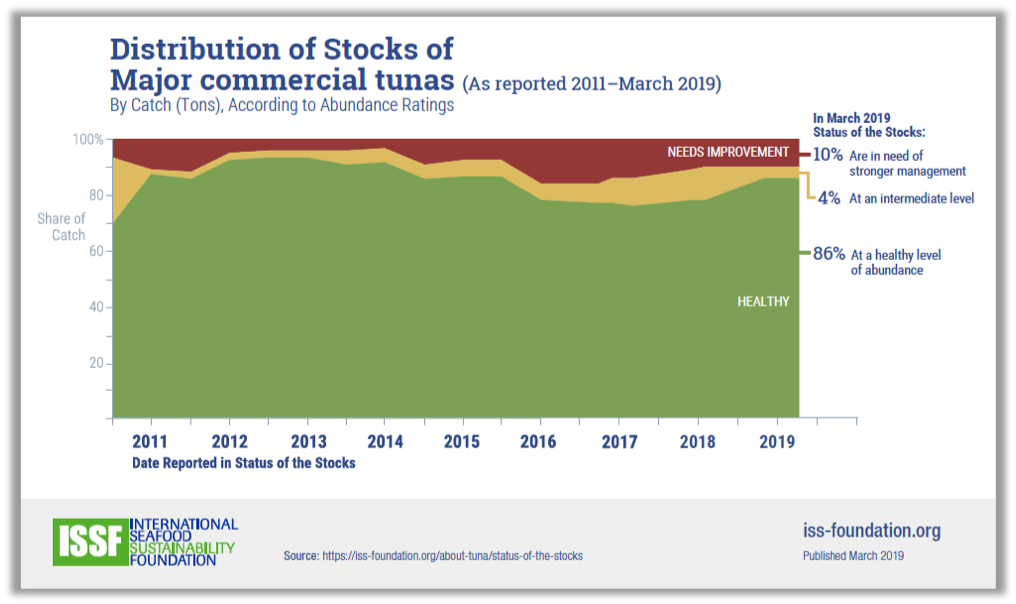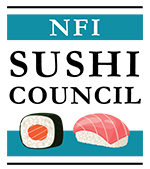Tuna Sustainability: Most Tuna Come from Healthy Stocks
Tuna Sustainability: Most Tuna Come from Healthy Stocks
Tuna is a healthy, nutritious, and sustainable option for families. The fiction peddled by agenda-driven activists claiming that tuna is being wiped off the map has once again been proven false – just look at the scientific research. Most commercial tuna comes from healthy stocks, according to the International Seafood Sustainability Foundation (ISSF) 2019 Status of the Stocks report.
86 Percent of Tuna Comes from Healthy Stocks
That’s right, a whopping 86 percent of tuna comes from stocks “at a healthy level of abundance,” with another 4 percent being “at an intermediate level.” The 10 percent of stocks needing stronger management are predominantly bluefin and bigeye tuna species, which are not found in canned and pouched tuna.
Canned and Pouched Tuna Are Particularly Sustainable
Skipjack and albacore tuna, the species that comprise the vast majority of canned or pouched tuna in the United States, are particularly sustainable. The nation’s leading seafood providers recognize the tremendous social and environmental responsibility that comes with meeting global tuna demand.
Leading U.S. tuna brands work in partnership with governments worldwide, the scientific community and leading global conservation organizations to ensure the long term health of all tuna stocks, particularly those used in canned or pouched tuna, while protecting our oceans and minimizing the impact of fishing on other marine animals.
The Number of Overfished Stocks are at an All Time Low
In a 2018 report to Congress, the National Oceanic and Atmospheric Administration (NOAA) found the number of U.S. stocks on the overfishing list remains near an all-time low. NOAA’s report also highlights the economic impact of seafood production in the U.S., supporting 1.6 million jobs in 2015. Through fisheries management, the U.S. is able to provide healthy seafood to Americans while ensuring generations to come have access to these important fisheries.
More on Sustainability
A presentation from renowned tuna fisheries scientist Alain Fonteneau of the French Research Institute for Development (IRP) confirms ongoing work makes tuna a sustainable fish.
A piece in SeafoodSource.com covering the presentation ahead of the 2017 Seafood Expo Global quotes Fonteneau as concluding that even as “[f]ishing effort[s] in most tuna fisheries [have] grown steadily in recent years. . .these stocks remain in a healthy state and are much less overfished than many other coastal resources…” Fonteneau noted global tuna stocks are “very robust” and “very difficult to heavily overfish,” and that none of the world’s 21 major tuna stocks have shown signs of critical collapse.
Commitment to Sustainability
The good news is there are responsible groups committed to real seafood sustainability, like the International Seafood Sustainability Foundation (ISSF) – a globally recognized collection of fisheries scientists and seafood sustainability experts. Tuna companies are committed to collaborating with ISSF and others to ensure that stocks are healthy not just today, but tomorrow and over the long term.
Seafood is a staple of a healthy diet, and there are few foods as versatile, delicious, affordable, and nutrient-rich as tuna. Americans concerned about the quality and sourcing of their food can sleep well at night knowing that America’s top tuna producers are committed to meeting global demand responsibly.




